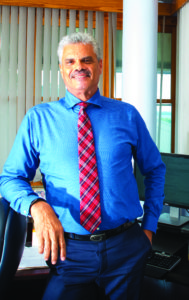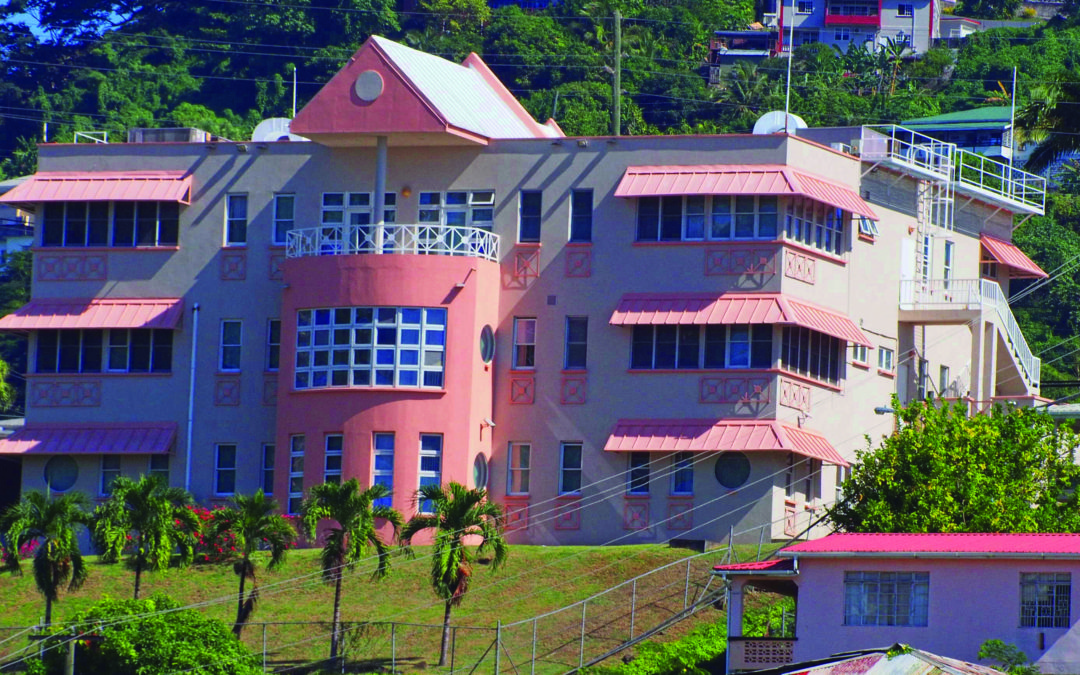Business Grenada Magazine meets a leader in the local Insurance Industry, Mr. Ronald Hughes.
“To Insure or not to Insure”, is not the question. It is vitally important to
PROTECT ONE’S ASSETS!
Shifting trends are the waters which Ronald Hughes, Managing Director of Guardian General Insurance (OECS) Ltd., has to anticipate, prepare for and strategically navigate. He shares with BG the evolution of the company, his experience at the helm of the business and how his corporation maintains one of the foremost positions within the Grenadian market.
Hughes began his career in Property and Casualty Insurance in 1984, with the Company then known as; Caribbean Insurance Co. Ltd. Over the years of the Company’s evolution a number of rebrands took place, with the final rebrand, as Guardian General Insurance (OECS) Ltd., occurring in 2015.
The business operated successfully under that name; (Caribbean Insurance Co. Ltd.) for many years, but due to another company with a similar name, a decision was taken to rebrand the company to Trans-Caribbean Insurance Co. Ltd. Sometime during the early1990’s, there was a further rebranding of the organization when NEM (West Indies) Insurance Ltd. NEMWIL, domiciled in Trinidad and Tobago, bought a substantial stake in the business. Consequently, it was re-named Trans-Nemwil Insurance (Grenada) Ltd.”
In 2005, both Nemwil and Caribbean Home Insurance Co. Ltd. were purchased by Guardian Holdings Ltd. (GHL). The companies were consolidated and the emerging entity was Guardian General Insurance Ltd.
 Hughes explains the transition – “We retained our Trans-Nemwil brand as it was a strong brand, particularly in the aftermath of Hurricane Ivan, We were riding a crest of goodwill during this period and to re-brand then could have proved counterproductive.”
Hughes explains the transition – “We retained our Trans-Nemwil brand as it was a strong brand, particularly in the aftermath of Hurricane Ivan, We were riding a crest of goodwill during this period and to re-brand then could have proved counterproductive.”
Whilst continuing to trade under the Trans- Nemwil brand, operational procedures were being aligned with the parent company and, in 2015, a decision was taken to rebrand to Guardian General Insurance (OECS) Ltd.
The inclusion of the Organization of Eastern Caribbean States (OECS), in the company name, is an important element. Its significance, he claims, is based on the future planned harmonized insurance legislation for the sub-region, as the Grenada office is destined to become the hub for The Guardian Group’s Property & Casualty, as well as its Life, Health and Pensions operations, in the Eastern Caribbean.
Grenada’s location at 12 degrees North of the Equator holds a favourable position in the minds of insurance underwriters, as it is typically spared many of the devastating hurricanes which have plagued the northern Caribbean territories. This is particularly true for the marine sector, because it is regarded as a reasonably safe location for marine interests, during the hurricane season. Hurricane Ivan was an exception.
Hughes speaks of the Hurricane experience: “Undoubtedly the losses arising from Hurricane Ivan were the most significant challenge the company has ever faced, to date. We had close to thirteen hundred (1300) claims to address! Ninety eight percent (98%) of them were settled by 31st of Dec, 2004 (Ivan hit on 7th Sept. 2004) and the remaining two percent (2%) were settled by March 2005. We certainly benefited from this prompt response, as our aggregate exposure and premium income increased significantly.
Following this major loss our reinsurance costs increased. The average property rate, prior to Hurricane Ivan, was approximately EC$6.00 per $1,000 subsequently rates climbed to $10.00 per $1,000 an almost 50% increase.” Hughes recalls, “rates remained static for some time however, pricing at that level, in this environment, is not sustainable, particularly with the large number of insurance companies trading in Grenada. At the time, there were approximately seventeen or eighteen Property & Casualty Insurers, serving a population of 110K, with very low insurance penetration.”
Hughes continues; “With so many choices available to the consumer, competition was intense, which resulted in a decline in property rates from 2006. What really drove the slide as well was the impact of the international financial crisis between 2008/2009, in addition to this was the fact that there was a sustained quiet period without any major catastrophic losses. The industry prospered, and Investors lured by these favourable returns, were drawn to the reinsurance industry, resulting in surplus capacity. This sent the market into a soft segment of the cycle and pricing plunged.”
Hughes further explains: “Catastrophes in the Northern Caribbean and the United States can affect insurance pricing for Grenadian consumers. Hurricane Andrew which hit Southern Florida in 1990 and the 911 terrorist event in 2011, severely impacted pricing levels in the Caribbean.
“The hurricane losses from “Harvey”, “Irma” and “Maria” in 2017, represented a combined loss to the industry, estimated to be in the region of US$115 Billion. Affected were :- Anguilla, Barbuda, Dominica, Puerto Rico, St. Thomas, Tortola and St. Marteen. The southern Caribbean was unaffected by these storms but pricing and terms in the territories were affected.
When reinsurers or insurers are faced with that level of loss they immediately seek to go into recovery mode. Prices are generally increased and terms and conditions of reinsurance treaties stiffened. Large losses, like the ones experienced during the 2017 hurricane season, also tend to cause underwriters to re-think their appetite for risk in catastrophe exposed areas like the Caribbean and if they withdraw, en masse from the region, capacity will be adversely affected. Some may cut their losses, pack their bags and leave, while others who elect to continue trading in the region will adjust their terms and conditions.
Following Hurricane Ivan, there was evidence of an increased interest in purchasing insurance and increasing existing sums insured on property insurance. The latter, was driven by many persons having their claims subject to average, because of under insurance. For example; if you have a property with a replacement cost (RC) of EC$1M and the Sum Insured (SI) is insured for EC$500,000, in the event of a loss, the claim adjustment would be subject to average, as the insured would be deemed a co-insurer of fifty percent (50%) of the property. The situation could be exacerbated should the loss be as a result of a catastrophe, where the deductible is two percent (2%) of the sum insured.” The following illustrates the formula for the calculation of average.
Grenada had approximately thirty thousand (30,000) buildings in 2004, at the time of Hurricane “Ivan”. According to the Association of Grenada Insurance Companies (AGIC), based upon data compiled from its membership, there were approximately five thousand (5000) claims reported and a number of properties had two or more claims impacting the same property. Of the approximate thirty thousand (30,000) buildings, more than seventy percent (70%) of them, say twenty-one thousand (21,000), were damaged in varying degrees. But there were only five thousand (5,000) claims reported, in the circumstances, one has to conclude that many buildings had no coverage.
To be quite honest one of the causes of this, Ronald Hughes believes, is an underlying distrust of the insurance industry. This distrust suppresses the willingness of persons to buy coverage, be it life, pension, or property. The recent failure of a large Caribbean financial institution, has further deepened this distrust. However, through various mediums, there is an ongoing effort to educate citizens, and businesses, regarding the advantages of protecting your assets, your financial security and that of your loved ones, through the purchase of insurance.
When seeking to purchase insurance you need to have the relevant information to present to the insurer. Hughes adds “Some people attempt to have insurers advise them on values. Personally, I see it as a conflict of interest. The insured is obliged to present that information to the insurer. We can assist by guiding the client, but ultimately it is the duty of the insured to provide accurate information. Should an individual or corporate body choose to give an insurer an exclusive on their business, there is the likelihood of being able to leverage better terms, particularly if the relationship is long term”.
Insurance
Sum insured (SI) $500,000 X Loss Incurred (LI) $250,000
Replacement cost (RC) $1,000,000
=$125,000 Pay out to the client
In closing Ronald Hughes states “Our rates are competitive and we maintain the lead position in the Grenada Insurance Market”.
Clearly according to Hughes, when it comes to Insurance…some things are just worth paying for.
So…”Protect your Assets!”
Guardian General Insurance provides insurance for residential properties, commercial interests, motor vehicles, public and employers liability, marine craft and cargo, aviation risks, construction and erection risks, financial risks, performance and bid bonds, and professional indemnity.
Parent Company GHL through its various subsidiaries trade in over 21 Caribbean Countries and is one of the largest Insurance providers in the region, with three divisions of operations covering General Ins. Life / Health / Pensions, and Asset/Wealth management.
Guardian General Insurance (OECS) Limited The Mutual/Trans-Nemwil Office Complex P.O.Box 221, The Villa St George’s Grenada West Indies Tel. 1 473 440 3099

